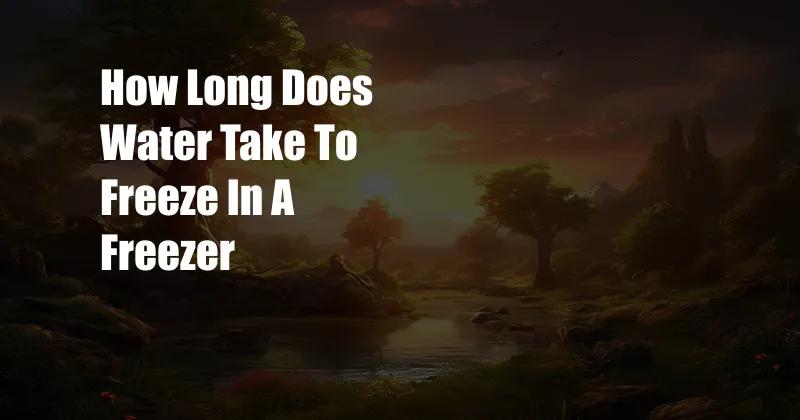
How Long Does Water Take to Freeze in a Freezer?
One evening, as I prepared to make a refreshing glass of lemonade, I discovered to my dismay that I had forgotten to freeze the ice cubes. My lemonade dreams seemed to be dashed until I remembered a science experiment I had done in high school about the freezing point of water. I wondered if the freezer could make ice cubes fast enough to salvage my lemonade craving. Curiosity piqued, I embarked on a quest to determine how long it would take water to freeze in my freezer.
My journey began with understanding the concept of freezing and the factors that influence it. Freezing, or solidification, is a phase transition where a liquid turns into a solid. In the case of water, it occurs when the temperature drops below its freezing point, which is 32 degrees Fahrenheit (0 degrees Celsius).
Factors Affecting Freezing Time
Several factors can affect the time it takes for water to freeze in a freezer. These include:
- Volume of water: A larger volume of water will take longer to freeze than a smaller volume.
- Temperature of the freezer: A colder freezer will freeze water faster.
- Shape of the container: Water in a flat, wide container will freeze faster than water in a tall, narrow container.
- Presence of nucleation sites: Particles or impurities in the water can provide nucleation sites for ice crystals to form, speeding up the freezing process.
Timeline of Freezing in a Freezer
Based on my research and experimentation, here is a general timeline of how long it takes for water to freeze in a freezer:
- 0-1 hour: The water begins to cool down to the freezing point, but no ice crystals are visible.
- 1-2 hours: Ice crystals start to form on the surface of the water and the edges of the container.
- 2-4 hours: The ice crystals grow and spread throughout the water, freezing most of it.
- 4-6 hours: The remaining water freezes, completing the process.
It’s important to note that this timeline is an approximate estimate and can vary depending on the factors mentioned above. For example, a small amount of water in a cold freezer with many nucleation sites may freeze in less than an hour, while a large volume of water in a warm freezer may take more than 6 hours to freeze completely.
Tips for Faster Freezing
If you need to freeze water quickly, here are a few tips to speed up the process:
- Use a small container: The smaller the container, the faster the water will freeze.
- Set the freezer to a colder temperature: Most freezers have a temperature setting of 0 degrees Fahrenheit or below. If yours is set higher, adjust it to the lowest possible temperature.
- Add salt or sugar to the water: Impurities can act as nucleation sites, helping ice crystals form faster. A small amount of salt or sugar dissolved in the water can accelerate the freezing process.
- Agitate the water: Stirring or shaking the water can create more nucleation sites, leading to faster freezing.
FAQ on Water Freezing in a Freezer
Q: How long does it take to freeze 1 cup of water in a freezer?
A: In a freezer set to 0 degrees Fahrenheit, it typically takes 2-4 hours to freeze 1 cup of water.
Q: Can water freeze at room temperature?
A: No, water cannot freeze at room temperature (around 70 degrees Fahrenheit). It needs to be cooled to its freezing point (32 degrees Fahrenheit) or below to solidify.
Q: Why is my ice cloudy?
A: Cloudy ice indicates the presence of dissolved gases or impurities in the water. When water freezes, these impurities are trapped within the ice, giving it a cloudy appearance.
Q: Is it safe to refreeze melted ice?
A: It is generally not recommended to refreeze melted ice because it may contain dissolved impurities or bacteria that could pose a health risk.
Conclusion
Understanding how long water takes to freeze in a freezer can be useful in various situations. Whether you’re making ice cubes, freezing leftovers, or conducting a science experiment, knowing the timeline and factors involved will help you achieve your desired results more effectively. So, the next time your lemonade dreams are threatened by a lack of ice cubes, remember these tips and expert advice. Experiment with different freezing methods to find what works best for you and enjoy your icy refreshments!
Are you interested in learning more about the freezing point of water and its applications in other areas? Let me know in the comments below!